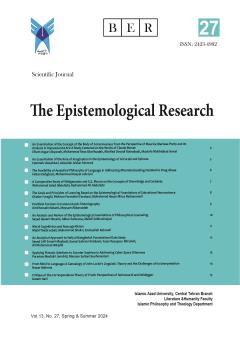Criticism of correspondence theory from the viewpoints of Suhrawardi and Heidegger
Subject Areas : Epistemological researches
1 - Allameh Tabataba'i University. Tehran. Iran.
Keywords: Suhrawardi, Heidegger, correspondence theory, unhiddenness, intuitive knowledge ,
Abstract :
Although the background of the correspondence theory as a criterion of truth goes back to the Plato's doctrine of ideas, the proposing and development of this theory takes place in Aristotle's philosophy. According to Aristotle, truth means the correspondence of a judgment or statement with reality, and untruth and falsehood mean non-correspondence. Since the time of Aristotle, the correspondence theory, despite its ups and downs, has always been one of the dominant theories in the field of epistemology. Of course, some philosophers, while paying attention to the correspondence theory, have pointed to something prior to this theory, which basically made it possible to be proposed. Heidegger and Suhrawardi, while criticizing the philosophical traditions before themselves, have emphasized that the basic understanding of man and his relationship with objects and phenomena is not a matter of proposition and judgment. Now important question arises: what is prior to the propositional truth that provides the possibility of truth in the meaning of correspondence? With a descriptive-analytical method, this article tries to investigate this question from the point of view of Suhrawardi and Heidegger. Heidegger believes that the truth in the sense of unhiddenness (Aletheia) is the primary meaning of truth, and the forgetting of this meaning has caused truth to be proposed in the meaning of correspondence. Suhrawardi also believes that truth in the sense of the intuition of objects precedes the correspondence theory. Heidegger and suhrawardi believe that the correspondence theory does not have the necessary efficiency for the disclosure of truth.
امین رضوی، مهدی. (1377). سهروردی و مکتب اشراق، ترجمه¬ مجدالدین کیوانی، تهران، نشر مرکز.
بیمل، والتر. (1393). بررسی روشنگرانه اندیشههای مارتین هایدگر، ترجمه بیژن عبدالکریمی، تهران، سروش.
سهرروردی، شهاب¬الدین یحیی. (1380). مجموعه مصنفات شیخ اشراق، ج1، تصحیح و مقدمۀ هانری کربن، تهران، پژوهشگاه علوم انسانی و مطالعات فرهنگی.
سهروردی، شهابالدین یحیی. (1380). مجموعه مصنفات شیخ اشراق، ج2 ،تصحیح و مقدمۀ هانری کربن، تهران، پژوهشگاه علوم انسانی و مطالعات فرهنگی.
شهرزوری، شمس¬الدین محمد. (1372). شرح حکمةالاشراق، تصحیح حسین ضیایی، تهران، پژوهشگاه علوم انسانی و مطالعات فرهنگی.
شیرازی، قطب¬الدین. (1383). شرح حکمةالاشراق، به اهتمام عبد الله نورانی و مهدی محقق، تهران، مؤسسه مطالعات اسلامی.
ضیایی، حسین. (1384). معرفت و اشراق در اندیشۀ سهروردی، ترجمۀ سیما سادات نوربخش، تهران، فرزان روز.
نصر، سید حسین. (1386). تاریخ فلسفۀ اسلامی، ترجمۀ جمعی از استادان، ج2، تهران، حکمت.
هایدگر، مارتین. (1384). «نامه¬ای درباره¬ی انسان¬گرایی»، ترجمه¬ عبدالکریم رشیدیان، از مدرنیسم تا پستمدرنیسم، تهران، نشر نی، صص. 281-318، چاپ چهارم.
هایدگر، مارتین. (1387). متافیزیک چیست؟، ترجمه سیاوش جمادی، تهران، ققنوس، چاپ پنجم.
هایدگر، مارتین. (1388). هستی و زمان، ترجمه¬ سیاوش جمادی، تهران، ققنوس، چاپ سوم.
هیدگر، مارتین. (1394). سرآغاز کار هنری، ترجمه¬ پرویز ضیاء شهابی، تهران، هرمس. چاپ ششم.
هیدگر، مارتین. (1397). مسائل اساسی پدیدارشناسی، ترجمه¬ پرویز ضیاء شهابی، تهران، انتشارات مینوی خرد، چاپ سوم.
یزدان¬پناه، سید یدالله. (1389). حکمت اشراق، تحقیق و نگارش مهدی علیپور، ج2، تهران، سمت.
Freidlaender. P. (1969). Plato: An Introduction, Translated by H. Meyerhoff, Second Edition, Princeton University Press.
Heidegger. M. (1998). “Plato’s Doctrine of Truth”, Translated by Thomas Sheehan, Pathmarks, Edited by William mcneill, Cambridge University Press, pp. 155-82.
Heidegger. M. (2002). The Essence of Truth: On Plato's Cave Allegory and Theaetetus, Translaeed by Ted Sadler, Continuum.
Inwood. M. (1999). A Heidegger dictionary, Oxford, Blackwell.
Ralkowski. M. A. (2009). Heidegger’s Platonism, London, Continuum.


